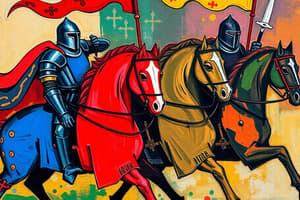Podcast
Questions and Answers
Quelle est l'origine du mot 'knight' en anglais ancien?
Quelle est l'origine du mot 'knight' en anglais ancien?
- Roi
- Prince
- Serviteur (correct)
- Guerrier
Quelle vertu faisait partie du code de conduite de la chevalerie?
Quelle vertu faisait partie du code de conduite de la chevalerie?
- Lâcheté
- Courage (correct)
- Ruse
- Cupidité
Comment les chevaliers étaient-ils généralement équipés pour le combat?
Comment les chevaliers étaient-ils généralement équipés pour le combat?
- Avec des haches de guerre
- Avec des épées, des lances et des boucliers (correct)
- Avec des massues et des dagues
- Avec des arcs et des flèches
Quel matériau était principalement utilisé pour fabriquer les armures des chevaliers?
Quel matériau était principalement utilisé pour fabriquer les armures des chevaliers?
Que protégeaient principalement les chevaliers avec leurs armures et armes?
Que protégeaient principalement les chevaliers avec leurs armures et armes?
Quel événement était une partie importante de la culture des chevaliers?
Quel événement était une partie importante de la culture des chevaliers?
Quel était le but principal des tournois pour les chevaliers?
Quel était le but principal des tournois pour les chevaliers?
Pourquoi le rôle du chevalier a-t-il commencé à évoluer au 16ème siècle?
Pourquoi le rôle du chevalier a-t-il commencé à évoluer au 16ème siècle?
Quelle caractéristique de la chevalerie est devenue plus liée aux comportements courtois que militaires?
Quelle caractéristique de la chevalerie est devenue plus liée aux comportements courtois que militaires?
Les chevaliers étaient-ils principalement attendus pour être des guerriers montés dans les temps médiévaux?
Les chevaliers étaient-ils principalement attendus pour être des guerriers montés dans les temps médiévaux?
Qu'est-ce qui a continué à persister malgré le déclin du rôle traditionnel des chevaliers?
Qu'est-ce qui a continué à persister malgré le déclin du rôle traditionnel des chevaliers?
Flashcards are hidden until you start studying
Study Notes
Knight
Knights were members of a group of men educated in chivalry who fought on horseback during the Middle Ages. Originally, knights were the mounted warriors of the great feudal lords, also known as vassals, who helped protect their lord's lands from invaders. They usually shared a bond with their lord, often swearing loyalty to each other through acts like oath taking or treating. Over time, knighthood became associated with courtly behavior, morality, ethics, and church sanction.
Origins
The origins of knighthood can be traced back to the Germanic warrior classes of the Early Middle Ages. The term "knight" comes from the Old English word cyning, which meant prince, ruler, or warrior. In German, the term was knecht, which meant servant.
Knighthood and Chivalry
Knights were expected to maintain a code of conduct known as chivalry. Chivalry encompassed a number of virtues, including loyalty, strength, courtesy, and courtesy to women. Knights were expected to uphold these principles, often through acts of valor and service to their lords or communities.
Armor and Weapons
Knights were well-equipped for battle, wearing suits of armor to protect themselves and carrying weapons such as swords, lances, and shields. Their armor was typically made of iron or steel, often decorated with patterns or engravings.
Tournaments
Tournaments were a significant part of knightly culture. These events, which were essentially staged battles, allowed knights to test their skills against each other and to display their prowess. They were often held in celebration of important events, such as a knight's first tournament or the betrothal of a princess.
The Decline of Knighthood
The decline of knighthood occurred gradually over time. By the 16th century, the traditional role of the knight as a mounted warrior was no longer as relevant, and the role of the knight began to shift to more administrative and diplomatic duties. The concept of chivalry persisted, but it became more associated with courtly behavior and less with martial prowess.
In summary, knights were a class of skilled warriors in the Middle Ages who were expected to uphold a code of conduct known as chivalry. Their role in battle and their adherence to chivalry made them a significant part of medieval society, even as their specific duties and responsibilities evolved over time.
Studying That Suits You
Use AI to generate personalized quizzes and flashcards to suit your learning preferences.



